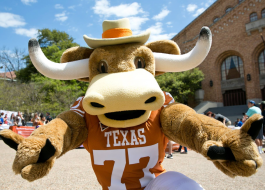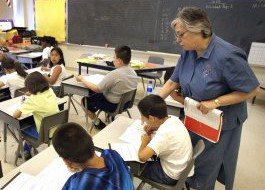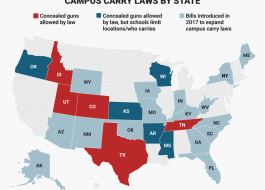
Every day at lunch, a handful of teenagers in Frisco, Texas, would pop into room C112, face a whiteboard and kneel for one of their five daily prayers.
It was just a spare classroom, used for everything from teachers’ grading to Buddhist meditation, school officials say. But Muslims at Liberty High seemed to like it.
“Takes like five minutes, instead of having to leave school, get in a car and go to my parents,” junior Sarah Qureshi told the school news site early this month.
“This is the seventh year we’ve been doing this, and we’ve never had one issue,” school principal Scott Warstler said.
Last week, however, top state officials learned about the room — and suddenly Liberty High had a big issue indeed.
The Texas attorney general’s office — famous for once suing a middle school principal to keep a Bible quote on a door — sent the Frisco school district superintendent a letter Friday raising “concerns.”
“It appears that the prayer room is ‘dedicated to the religious needs of some students,’” a deputy attorney general wrote in the letter, quoting an article written by an 11th grade student, “namely, those who practice Islam.”
In a news release the same day, the attorney general’s office went further: “Recent news reports have indicated that the high school’s prayer room is … apparently excluding students of other faiths,” the release said.
That would be a constitutional violation, the Texas AG’s office noted.
And totally untrue, according to Frisco Independent School District officials, who say state officials didn’t even ask them about the prayers before the letter ended up in Texas Gov. Greg Abbott’s tweet.
The Texas Attorney General is looking into the Public School Prayer Room issue many of you have questioned. #txlege https://t.co/21oyrgPKI1
— Greg Abbott (@GregAbbott_TX) March 17, 2017“This ‘press release’ appears to be a publicity stunt by the OAG to politicize a nonissue,” schools superintendent Jeremy Lyon wrote in reply to the state. “Frisco ISD is greatly concerned that this type of inflammatory rhetoric in the current climate may place the District, its students, staff, parents and community in danger of unnecessary disruption.”
Texas Attorney General Ken Paxton has often criticized what he calls anti-Christian discrimination in Texas schools. In 2015, Paxton joined 15 other states in opposing an atheist society’s lawsuit to stop school board officials from reading religious prayers before public meetings.
Paxton attracted national attention last December when he waded into a dispute in Killeen between a middle school principal and a nurse’s aide who put up a six-foot poster in the school with a quote from the classic animation special “A Charlie Brown Christmas” that read: “For unto you is born this day in the city of David a Savior which is Christ the Lord.”
After the principal told the aide to take the poster down, Paxton wrote to the Killeen school district: “These concerns are not surprising in an age of frivolous litigation by anti-Christian interest groups … Rescind this unlawful policy.”
When the school district refused, Paxton helped the nurse’s aide sue, and won.
 Texas Attorney General Ken Paxton, (third from left). AP Photo/Eric Gay
Texas Attorney General Ken Paxton, (third from left). AP Photo/Eric Gay
Three months later, his eye fell on Frisco.
We “recently became aware of Liberty High School’s prayer room,” Deputy Attorney General Andrew Leonie wrote to the schools superintendent — about two weeks after the room was profiled in the student newspaper. “Our initial inquiry left several questions unresolved.”
It sounded like the state had been investigating the matter, but school officials said they were blindsided when reporters started calling on Friday.
“What initial inquiry are you referring to?” the superintendent wrote in his reply to Paxton’s office, asking for evidence that the school was breaking any rules, and whether the state had made any attempt to find out before going public.
A week before the attorney general’s letter, Liberty High’s principal had welcomed all students to use the room in an interview with KERA public radio.
“All sorts of folks use it,” school district spokesman Chris Moore told The Washington Post on Saturday. “Muslims pray, Baptists pray, Catholics pray, Buddhists pray, Hindu students pray.”
Moore said he called and emailed Paxton’s office after learning about the letter, but had not received a reply.
The Post asked Paxton’s office what led the state to become concerned about the prayer room, and what inquiries state officials had made after learning about it. A spokesman for the attorney general replied with a statement that did not directly answer most of the questions:
“The letter was sent to the school district via email prior to issuance of a press release,” the spokesman wrote. “We sent the letter to clarify unresolved questions in the interest of protecting religious liberty in public schools across Texas (the same interest we sought to protect in the Charlie Brown matter).”
But as of Saturday, school officials in Frisco were still trying to figure out exactly what Paxton’s issue was.
"We hadn’t been contacted by right-wing groups, left-wing groups or in-between groups,” Moore said. “Getting that question yesterday from the attorney general was surprising.”
Regardless, he said, the room would be open for prayer as usual come lunchtime Monday — as it has for many years.
Read the original article on Texas Tribune. The Texas Tribune is a nonpartisan, nonprofit media organization that informs Texans — and engages with them – about public policy, politics, government and statewide issues. Copyright 2017. Follow Texas Tribune on Twitter.




